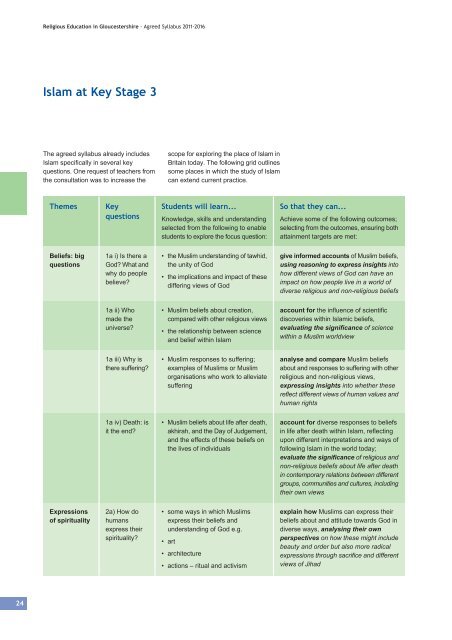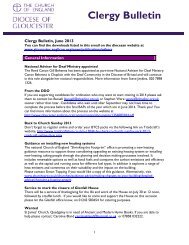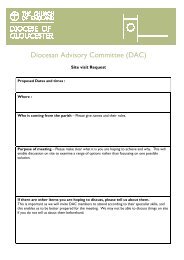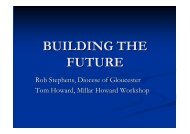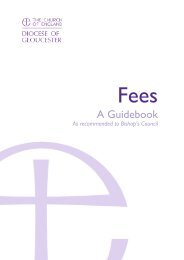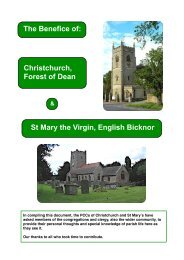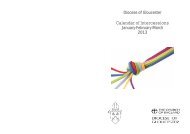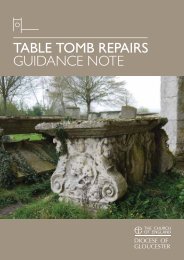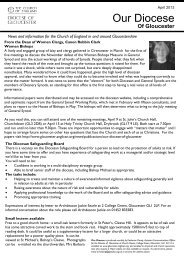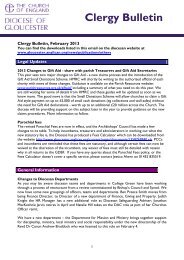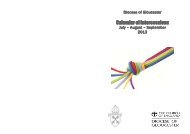Download the Revised RE Syllabus 2011 - Diocese of Gloucester
Download the Revised RE Syllabus 2011 - Diocese of Gloucester
Download the Revised RE Syllabus 2011 - Diocese of Gloucester
Create successful ePaper yourself
Turn your PDF publications into a flip-book with our unique Google optimized e-Paper software.
Religious Education in <strong>Gloucester</strong>shire - Agreed <strong>Syllabus</strong> <strong>2011</strong>-2016<br />
Islam at Key Stage 3<br />
The agreed syllabus already includes<br />
Islam specifically in several key<br />
questions. One request <strong>of</strong> teachers from<br />
<strong>the</strong> consultation was to increase <strong>the</strong><br />
scope for exploring <strong>the</strong> place <strong>of</strong> Islam in<br />
Britain today. The following grid outlines<br />
some places in which <strong>the</strong> study <strong>of</strong> Islam<br />
can extend current practice.<br />
Themes<br />
Key<br />
questions<br />
Students will learn...<br />
Knowledge, skills and understanding<br />
selected from <strong>the</strong> following to enable<br />
students to explore <strong>the</strong> focus question:<br />
So that <strong>the</strong>y can...<br />
Achieve some <strong>of</strong> <strong>the</strong> following outcomes;<br />
selecting from <strong>the</strong> outcomes, ensuring both<br />
attainment targets are met:<br />
Beliefs: big<br />
questions<br />
1a i) Is <strong>the</strong>re a<br />
God What and<br />
why do people<br />
believe<br />
• <strong>the</strong> Muslim understanding <strong>of</strong> tawhid,<br />
<strong>the</strong> unity <strong>of</strong> God<br />
• <strong>the</strong> implications and impact <strong>of</strong> <strong>the</strong>se<br />
differing views <strong>of</strong> God<br />
give informed accounts <strong>of</strong> Muslim beliefs,<br />
using reasoning to express insights into<br />
how different views <strong>of</strong> God can have an<br />
impact on how people live in a world <strong>of</strong><br />
diverse religious and non-religious beliefs<br />
1a ii) Who<br />
made <strong>the</strong><br />
universe<br />
• Muslim beliefs about creation,<br />
compared with o<strong>the</strong>r religious views<br />
• <strong>the</strong> relationship between science<br />
and belief within Islam<br />
account for <strong>the</strong> influence <strong>of</strong> scientific<br />
discoveries within Islamic beliefs,<br />
evaluating <strong>the</strong> significance <strong>of</strong> science<br />
within a Muslim worldview<br />
1a iii) Why is<br />
<strong>the</strong>re suffering<br />
• Muslim responses to suffering;<br />
examples <strong>of</strong> Muslims or Muslim<br />
organisations who work to alleviate<br />
suffering<br />
analyse and compare Muslim beliefs<br />
about and responses to suffering with o<strong>the</strong>r<br />
religious and non-religious views,<br />
expressing insights into whe<strong>the</strong>r <strong>the</strong>se<br />
reflect different views <strong>of</strong> human values and<br />
human rights<br />
1a iv) Death: is<br />
it <strong>the</strong> end<br />
• Muslim beliefs about life after death,<br />
akhirah, and <strong>the</strong> Day <strong>of</strong> Judgement,<br />
and <strong>the</strong> effects <strong>of</strong> <strong>the</strong>se beliefs on<br />
<strong>the</strong> lives <strong>of</strong> individuals<br />
account for diverse responses to beliefs<br />
in life after death within Islam, reflecting<br />
upon different interpretations and ways <strong>of</strong><br />
following Islam in <strong>the</strong> world today;<br />
evaluate <strong>the</strong> significance <strong>of</strong> religious and<br />
non-religious beliefs about life after death<br />
in contemporary relations between different<br />
groups, communities and cultures, including<br />
<strong>the</strong>ir own views<br />
Expressions<br />
<strong>of</strong> spirituality<br />
2a) How do<br />
humans<br />
express <strong>the</strong>ir<br />
spirituality<br />
• some ways in which Muslims<br />
express <strong>the</strong>ir beliefs and<br />
understanding <strong>of</strong> God e.g.<br />
• art<br />
• architecture<br />
• actions – ritual and activism<br />
explain how Muslims can express <strong>the</strong>ir<br />
beliefs about and attitude towards God in<br />
diverse ways, analysing <strong>the</strong>ir own<br />
perspectives on how <strong>the</strong>se might include<br />
beauty and order but also more radical<br />
expressions through sacrifice and different<br />
views <strong>of</strong> Jihad<br />
24


